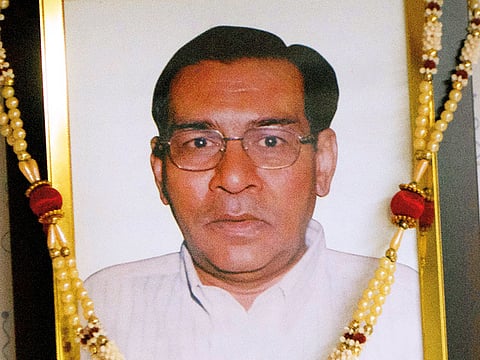Killed for bringing out the truth and exposing graft
Indians file as many as 6 million open-record requests a year

Mumbai: In a house tucked away in a teeming, low-income Mumbai neighbourhood, Bhupendra Vira began a relentless campaign. The 62-year-old man wanted his steelworks factory back.
Vira’s family claims that his landlord forcefully seized the factory. The landlord owned Vira’s home but had no claim to the factory, Vira said in a police complaint from 2010. Vira had been paying rent for his home regularly and noted in the complaint that he was a law-abiding citizen.
Vira believed local authorities were helping the landlord legitimise claims to properties in the area, his son-in-law Sudhir Gala said. So, to prove that the property was his, he started collecting a mountain of papers under his bed and in his wardrobe — documents obtained through India’s freedom of information legislation.
Vira soon uncovered evidence suggesting that his landlord controlled several unlicensed properties. Authorities took note of his investigation and started tearing down the illegal structures.
‘Blood everywhere’
Vira always knew his work was dangerous. That’s why he made multiple appeals to his local police station asking for protection. That’s why he made copies of copies, all neatly filed.
Then one evening in October, while he was watching television, someone came into his home and shot him in the head. “There was blood everywhere, and a hole inside his head,” said Ranjan Vira, Bhupendra’s wife, who found him. “I used my scarf to cover his wound. My nightgown was soaked with his blood.”
An officer investigating the case said police think Vira was killed because of the complaints he made to authorities based on his right to information requests.
In India, where corruption is rampant and injustices are many, ordinary citizens have turned into investigators. Indians make approximately four million to six million requests every year, said Anjali Bhardwaj of the National Campaign for People’s Right to Information.
But many of those who file right-to-information requests know the risks involved. The Commonwealth Human Rights Initiative lists at least 60 people who were brutally killed after they filed requests since the Act was introduced in 2005. At least 300 others have been harassed or physically hurt. Activists say the figure is likely to be a conservative estimate, compiled from news stories, as authorities do not separately record deaths linked to right to information.
“This is uniquely a South Asian phenomenon,” said Venkatesh Nayak, coordinator of the Access to Information Programme at the Commonwealth Human Rights Initiative, speaking about the killings. “It started in India in 2007-2008 and now we are hearing of cases of assault and intimidation from Bangladesh as well.”
India is one of 70 countries with a freedom-of-information law. According to a recent report by Transparency International, India is also the most corrupt country in Asia, with 69 per cent of respondents saying they had accessed public services by paying a bribe.
“It’s very critical to understand the nature of corruption in our country,” Bhardwaj said.
“It’s unlike Western countries, where you have corruption at the highest level but things work at the lowest level. In India, you have corruption at every single level.”
More than half of all requests for information come from people living in poverty, according to a report by the Right to Information Assessment and Advocacy Group from 2014 in which a random sample of applicants were surveyed.
“There is a very strong people’s demand for the right-to-information law,” Bhardwaj said. “It is used and owned by the common and ordinary citizens of the country.”
Since the legislation was introduced in 2005, Bhardwaj said, successive governments have tried to weaken it. Recently, Prime Minister Narendra Modi’s Bharatiya Janata Party-led government, which claims to have “not even one taint or blot” of corruption, proposed rules to end appeals to the Information Commission if an applicant dies. If implemented, campaigners say, the rule could prompt more killings like Vira’s.
— Washington Post
Sign up for the Daily Briefing
Get the latest news and updates straight to your inbox


